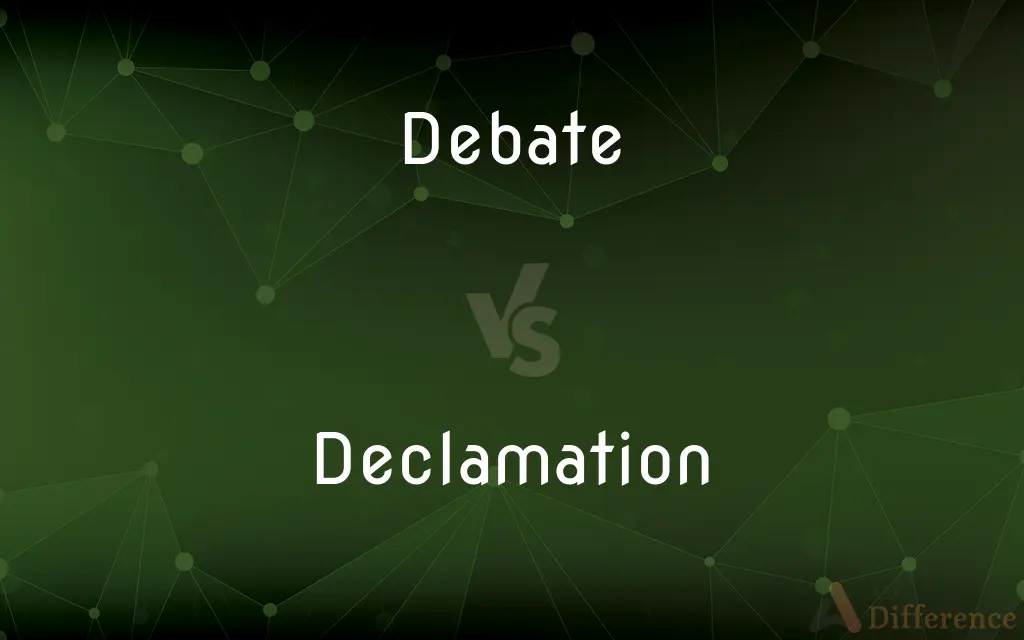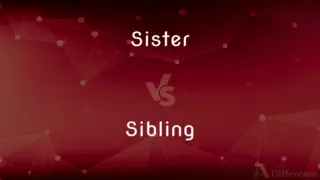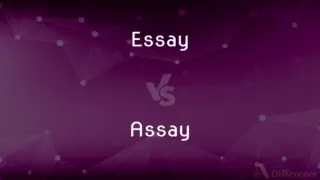Debate vs. Declamation — What's the Difference?
By Tayyaba Rehman — Updated on November 1, 2023
Debate is a structured argument with opposing viewpoints, while declamation is the recitation of a speech, often from historical works.

Difference Between Debate and Declamation
Table of Contents
ADVERTISEMENT
Key Differences
Debate involves interactive communication where participants present and argue over different points of view. Declamation, in contrast, is about delivering a pre-written speech with expressive articulation and gestures.
In a debate, speakers are expected to respond to opponents' arguments, often in a live format. Declamation requires no response to others, focusing instead on the effective presentation of a single, often renowned, piece of rhetoric.
Debaters aim to persuade the audience or judges through logic, facts, and rebuttals. Declamations are judged on delivery, command of language, and emotional impact, often without the need for factual backing.
A debate is usually a competitive event where a winner is declared based on argumentative skill. Declamation is also competitive but prioritizes the speaker's ability to convey the message of the original text powerfully.
The objective of a debate is to engage in critical thinking and public discourse. Declamation aims to inspire, educate, or entertain through eloquent expression and performance.
ADVERTISEMENT
Comparison Chart
Nature
Interactive and argumentative.
Performative and recitative.
Purpose
To persuade through argument.
To convey a message with emotional impact.
Format
Opposing viewpoints presented.
Single speech presented.
Judging Criteria
Logical structure, evidence, rebuttal.
Delivery, expression, memorization.
Dependency on Others
Requires an opponent.
Solo performance.
Compare with Definitions
Debate
Formal discussion on a particular topic
The candidates faced off in a heated debate.
Declamation
Public speaking display
His declamation captivated the audience.
Debate
Consideration of opposing arguments
He entered the debate with clear points in mind.
Declamation
Recitation of a speech
His declamation of Lincoln's address was moving.
Debate
Deliberation over a decision
The committee's debate lasted for hours.
Declamation
Delivery of a formal oration
The student's declamation won the contest.
Debate
Debate is a process that involves formal discourse on a particular topic. In a debate, arguments are put forward for often opposing viewpoints.
Declamation
Dramatic reading of a text
She practiced her declamation for the assembly.
Debate
A formal discussion on a particular matter in a public meeting or legislative assembly, in which opposing arguments are put forward and which usually ends with a vote
Last night's debate on the Education Bill
Declamation
Declamation (from the Latin: declamatio) is an artistic form of public speaking. It is a dramatic oration designed to express through articulation, emphasis and gesture the full sense of the text being conveyed.
Debate
Argue about (a subject), especially in a formal manner
MPs debated the issue in the Commons
Members of the society debated for five nights
Declamation
The action or art of declaiming
Declamations of patriotism
Shakespearean declamation
Debate
To consider something; deliberate.
Declamation
A recitation delivered as an exercise in rhetoric or elocution.
Debate
To engage in argument by discussing opposing points.
Declamation
Vehement oratory.
Debate
To engage in a formal discussion or argument.
Declamation
A speech marked by strong feeling; a tirade.
Debate
(Obsolete) To fight or quarrel.
Declamation
The act or art of declaiming; rhetorical delivery; loud speaking in public.
Debate
To deliberate on; consider.
Declamation
The public recitation of speeches as an exercise in schools and colleges.
Debate
To dispute or argue about.
Declamation
A set or harangue; declamatory discourse.
Debate
To discuss or argue (a question, for example) formally.
Declamation
Pretentious rhetorical display, with more sound than sense.
Mere declamation
Debate
(Obsolete) To fight or argue for or over.
Declamation
The act or art of declaiming; rhetorical delivery; haranguing; loud speaking in public; especially, the public recitation of speeches as an exercise in schools and colleges; as, the practice declamation by students.
The public listened with little emotion, but with much civility, to five acts of monotonous declamation.
Debate
A discussion involving opposing points; an argument.
Declamation
A set or harangue; declamatory discourse.
Debate
Deliberation; consideration
Passed the motion with little debate.
Declamation
Pretentious rhetorical display, with more sound than sense; as, mere declamation.
Debate
A formal contest of argumentation in which two opposing teams defend and attack a given proposition.
Declamation
Vehement oratory
Debate
(Obsolete) Conflict; strife.
Declamation
Recitation of a speech from memory with studied gestures and intonation as an exercise in elocution or rhetoric
Debate
An argument, or discussion, usually in an ordered or formal setting, often with more than two people, generally ending with a vote or other decision.
After a four-hour debate, the committee voted to table the motion.
Declamation
Rhetorical exercise
Declamation is a key component of classical education.
Debate
An informal and spirited but generally civil discussion of opposing views.
The debate over the age of the universe is thousands of years old.
There was a bit of a debate over who should pay for the damaged fence.
Debate
(uncountable) Discussion of opposing views.
There has been considerable debate concerning exactly how to format these articles.
Debate
(frequently in the French form débat) A type of literary composition, taking the form of a discussion or disputation, commonly found in the vernacular medieval poetry of many European countries, as well as in medieval Latin.
Debate
(obsolete) Strife, discord.
Debate
To participate in a debate; to dispute, argue, especially in a public arena.
Debate
To fight.
Debate
To engage in combat for; to strive for.
Debate
(transitive) To consider (to oneself), to think over, to attempt to decide
Debate
To engage in combat for; to strive for.
Volunteers . . . thronged to serve under his banner, and the cause of religion was debated with the same ardor in Spain as on the plains of Palestine.
Debate
To contend for in words or arguments; to strive to maintain by reasoning; to dispute; to contest; to discuss; to argue for and against.
A wise council . . . that did debate this business.
Debate thy cause with thy neighbor himself.
Debate
To engage in strife or combat; to fight.
Well could he tourney and in lists debate.
Debate
To contend in words; to dispute; hence, to deliberate; to consider; to discuss or examine different arguments in the mind; - often followed by on or upon.
He presents that great soul debating upon the subject of life and death with his intimate friends.
Debate
A fight or fighting; contest; strife.
On the day of the Trinity next ensuing was a great debate . . . and in that murder there were slain . . . fourscore.
But question fierce and proud replyGave signal soon of dire debate.
Debate
Contention in words or arguments; discussion for the purpose of elucidating truth or influencing action; strife in argument; controversy; as, the debates in Parliament or in Congress.
Heard, noted, answer'd, as in full debate.
Debate
Subject of discussion.
Statutes and edicts concerning this debate.
Debate
A discussion in which reasons are advanced for and against some proposition or proposal;
The argument over foreign aid goes on and on
Debate
The formal presentation of and opposition to a stated proposition (usually followed by a vote)
Debate
Argue with one another;
We debated the question of abortion
John debated Mary
Debate
Think about carefully; weigh;
They considered the possibility of a strike
Turn the proposal over in your mind
Debate
Discuss the pros and cons of an issue
Debate
Have an argument about something
Debate
A contest of persuasive communication
The debate team won the championship.
Debate
Public discourse on an issue
The debate on climate change continues.
Common Curiosities
Can debates be scripted?
Debates are generally unscripted to allow for dynamic exchange.
Are declamations original speeches?
Declamations are usually historical or famous speeches, not original works.
Do debates have a set structure?
Yes, debates often follow a formal structure with timed speeches and rebuttals.
Can anyone participate in debates or declamations?
Yes, with preparation and understanding of the format.
Are notes allowed in declamation?
Generally, no. Declamations are to be recited from memory.
Can debates be informal?
Yes, informal debates can occur in everyday conversations.
Can declamation be on any topic?
Yes, as long as the speech is recognized for its rhetorical merit.
How are debaters judged?
By the strength of their arguments, rebuttals, and delivery.
What is the primary goal of a debate?
To persuade or out-argue the opposing side.
What is the focus of declamation?
To deliver a speech effectively, emphasizing emotional appeal and delivery.
What skills does declamation enhance?
Public speaking, memorization, and expressive communication.
Is memorization important in declamation?
Yes, declamations typically require the speech to be memorized.
Is expressive body language important in declamation?
Yes, it's key for conveying the speech's emotional content.
What skills are developed through debating?
Critical thinking, public speaking, and argumentation skills.
Do you need a partner for debating?
Typically, debates involve teams or at least two individuals.
Share Your Discovery

Previous Comparison
Sister vs. Sibling
Next Comparison
Essay vs. AssayAuthor Spotlight
Written by
Tayyaba RehmanTayyaba Rehman is a distinguished writer, currently serving as a primary contributor to askdifference.com. As a researcher in semantics and etymology, Tayyaba's passion for the complexity of languages and their distinctions has found a perfect home on the platform. Tayyaba delves into the intricacies of language, distinguishing between commonly confused words and phrases, thereby providing clarity for readers worldwide.
















































